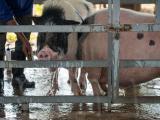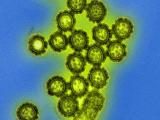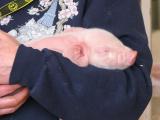Jun 3, 2009
Global novel flu count exceeds 19,000
The global number of novel flu cases grew to 19,273 cases, including 117 deaths, in 66 countries, the World Health Organization (WHO) reported today. Countries appearing on the list for the first time include Bulgaria, Egypt, Lebanon, and Nicaragua. The United States, Mexico, and Canada continued to lead the list; other countries with more than 300 cases are Australia, Chile, Japan, and the United Kingdom.
[WHO update 43]
US novel H1N1 cases surpass 11,000
The number of novel H1N1 cases in the United States grew to 11,054, the Centers for Disease Control and Prevention (CDC) reported today. For the first time the total includes cases from the territory of Puerto Rico, which has confirmed 6 cases. The number of deaths reported to the CDC stands at 17, which doesn't include new fatalities reported by Texas and New York or a death reported today in a 34-year-old Virginia woman who lived in a state-run facility.
[Current CDC numbers]
World Bank approves $500 million to fight new virus
The World Bank yesterday approved a $500 million program to offer developing and middle-income countries speedy access to funds to prevent and control novel H1N1 virus outbreaks. The amount will be added to an existing $500 million credit line established in January 2006 to help countries battle H5N1 avian influenza. The program helps governments buy items such as drugs and medical equipment and finance measures such as surveillance upgrades and communication campaigns.
[Jun 2 World Bank press release]
Saudi Arabia, Nicaragua, Bermuda report first cases
Saudi Arabia, Nicaragua, and Bermuda are the latest jurisdictions reporting their first novel H1N1 cases, according to media reports. Saudi Arabia's first case is in a nurse who got sick after arriving from the Philippines, Voice of America News reported. Reports on Nicaragua's first case didn't say whether the 5-year-old patient had a travel history. Bermuda's case is in a 13-year-old visitor from the United States, according to a local report.
[Jun 3 VOA News story]
Chile reports first novel flu death in South America
Chile's health ministry yesterday reported that a 37-year-old man who worked as a plumber died of novel H1N1 influenza, the first death from the disease in South America, the Associated Press (AP) reported. The report said he died of "massive respiratory failure" but did not mention if he had an underlying medical condition. Chile has the most cases in South America with 313, according to the WHO's latest count.
Sources say WHO will declare a pandemic soon
Three anonymous sources predicted that the WHO will raise its pandemic alert to its highest level within the next 10 days, Bloomberg News reported today. Raising the alert level to phase 6 may trigger new pandemic planning actions around the globe, but WHO officials have said they worry that the action could cause panic and that they are watching for further evidence of sustained community transmission outside North America, where the virus first gained a foothold.
[Jun 3 Bloomberg News story]
WHO boosts Nigeria's antiviral stockpile
Nigeria's news agency reported yesterday that WHO donated $2.8 million worth of oseltamivir (Tamiflu) to the country's pandemic stockpile, according to Xinhua, China's state news agency. The amount of medication is enough to treat at least 184,800 people. The WHO representative in Nigeria said the nation is one of 72 vulnerable countries to receive antiviral medications, which can also be used to prevent and treat H5N1 avian influenza.
[Jun 3 Xinhua story]
USDA to provide seed virus for novel H1N1 swine vaccine
The US Department of Agriculture (USDA) said yesterday it would provide a master seed virus that veterinary biologics manufacturers can use to make a novel H1N1 vaccine for swine. The agency expects to have the seed virus ready in early or mid July. Providing all manufacturers with the seed virus will save them time and lead to earlier availability of a vaccine in case the new virus spreads in swine, the USDA said. It said existing vaccines are not likely to protect animals from the new virus.
[Jun 2 USDA press release]



















